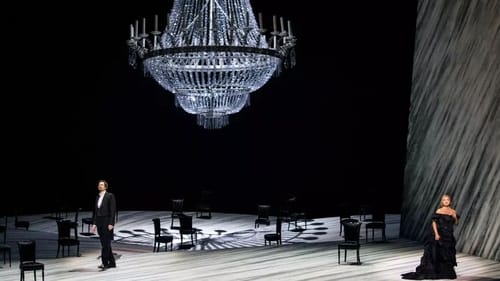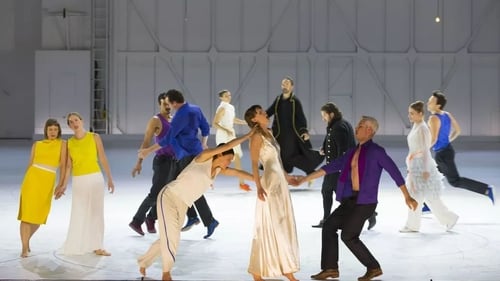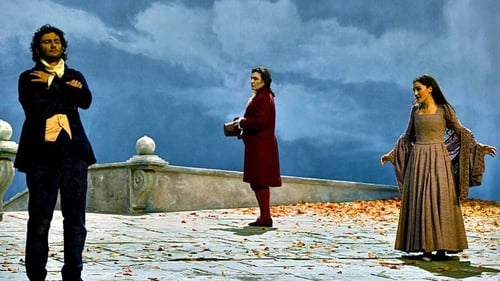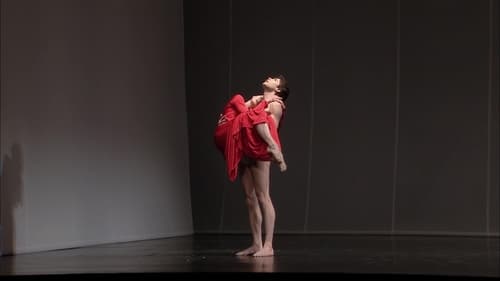
Self
Running through Bartók’s disenchanted tale, whose haunting music was initially condemned as unplayable, and the expression of despair in Poulenc’s monologue, the director Krzysztof Warlikowski perceives a shared dramatic thread, a shared feminine consciousness and a shared sense of imprisonment and suffocation: for the woman who penetrates the confines of Bluebeard’s castle and Elle, the woman who clings to a telephone conversation with a man as the only thing worth living for, are condemned to share the same fate. And this man she speaks to, does he really exist? Unless the director has interpreted Cocteau’s words to the letter and the telephone has become a “terrifying weapon that leaves no trace, makes no noise”…

No one better described the half-starved, struggling artists than Murger in his Scènes de la Vie de Bohème: artists ready to burn a manuscript to try to keep warm yet,in an era of triumphant bourgeois materialism, dreaming of another existence. Taking up these scenes of Bohemian life, Puccini offers us a heart-breaking love story and some of the most beautiful music in the history of opera in the story of the poet Rodolfo and fragile Mimi. The staging of this new production has been entrusted to Claus Guth who sets the drama in a future devoid of hope in which love and art become the sole means of transcendence.

Inspired by Pushkin's masterpiece of Russian literature, Tchaikovsky’s opera provides a sublime portrait – both ironic and sympathetic – of a character embittered by society life, rejecting love out of vanity, killing his friend the poet Lenski out of pride and spending the rest of his days in abject despair. A repertoire classic, Willy Decker’s streamlined production makes the Paris Opera echo once more to the strains of Russian romantic music. Edward Gardner conducts an exceptional cast including Peter Mattei in the title role and Anna Netrebko as Tatiana.

Prompted by Don Alfonso, a cynical old philosopher, two young idealists decide to put their lovers’ fidelity to the test. But love will teach them a bitter lesson: those who believe themselves phoenixes and goddesses will discover the desires of the flesh… In 1790, one year after the French Revolution, in what would be their final collaboration, Mozart and Da Ponte conduct a scientific investigation of love. With six singers doubled by six dancers, Anne Teresa De Keersmaeker depicts the desire which unites and separates human beings, like the interactions between atoms that, once broken, make new bonds possible

Debussy's masterpiece, for the first time conducted by the Paris Opera's music director Philippe Jordan, in the fairy staging by Robert Wilson. When Prince Golaud, grandson of King of Allemonde, meets the beautiful Mélisande, he knows nothing about her. Though, he marries her. A few months later, Golaud announces his wedding to his brother Pelléas, who seems to be falling in love with the woman.

In 2012, the Opéra national de Paris mounted a new production of Rudolf Nureyev's celebrated re-interpretation of the Minkus–Petipa ballet Don Quixote. Goya-inspired sets by Alexandre Beliaev and costumes by Elena Rivkina, and a ravishing performance by the Orchestre de l'Opéra national de Paris under the direction of Kevin Rhodes make for an unforgettable adventure into this magical and comical world.

Premiered in Paris in 1870, and inspired by the fantastical writings of E.T.A Hoffmann, Coppélia tells the story of a young man who falls in love with an exquisite automaton. He is finally brought to his senses by his fiancée. In his production from the magnificent Palais Garnier, choreographer Patrice Bart reveals his interpretation of the ballet.

In 2009, Frédéric Mistral’s tale of love and loss in Provence came to the Opéra de Paris with a new production of Gounod’s 1864 opera Mireille. Nicolas Joel’s naturalistic staging frames the accomplished performances of Albanian soprano Inva Mula as Mireille and American tenor Charles Castronovo as her ardent country lover Vincent.

Werther loves Charlotte, but she promised her mother on her deathbed that she would marry Albert. After the marriage Charlotte suggests that Werther should travel - but not forget her. In addition to the singing and orchestral accompaniment, the entire cast acts very convincingly. And, there's no backstage mugging, entrances and spoken nonsense to spoil the experience of the drama.

For the first time at the Paris Opera, Natalie Dessay sings one of the most beautiful roles of Italian romanticism. She embodies the modest and charming Amina, this sleepwalker who, escaping from her bedroom, becomes another person as she wanders through the night. This opera by Bellini is a score seemingly written in a daydream, where melody is apparently suspended in time and the heroine's very soul rises to the surface, and where instruments take on transparent tones. At the same time, Bellini portrays the cruelest of worlds – our own – where it is more than difficult for fragility and gentleness to shine past the darker rashness and unfriendliness of the characters.

Verdi's Macbeth performed by Opéra National de Paris

An adaptation of Charles Perrault's fairy tale by Rudolf Nureyev, putting Cinderella beneath the spotlight. When Rudolf Nureyev asked set designer Petrika Ionesco to work on his forthcoming ballet, he did not expect him to give such an innovative arrangement of Perrault's or Petipa's Cinderella. Still, after a hostile reaction, the choreographer was seduced by the idea. Because in essence, the "topic" was preserved, although modernized. A young woman is victimized by a morbid family, and her only wish is to escape the oppressive world in which she lives. One day, her kindness is rewarded: while she runs to help a person who needs help, she changes her destiny forever. This character, who embodies the fairy in Perrault's tale, is a Hollywood producer... And this is how Nureyev turns the film star into a modern prince charming.

The Ballet de l'Opera National de Paris mounted this production of the late Pina Bausch's dance-opera Orpheus und Eurydike, which Bausch had adapted from composer Christoph Willibald-Gluck and Ranieri de' Calzabigi's 1762 opera Orfeo ed Euridice. As the title suggests, it takes its basic narrative from the myth of Orpheus, and his courageous but ill-fated attempt to rescue his lover Eurydice (also known as Eurydike) from the jaws of the underworld. This particular production finds Yann Bridard dancing as Orpheus and Marie-Agnès Gillot dancing as Eurydike , with mezzo-soprano Maria-Riccarda Wesseling accompanying Bridard and soprano Julia Kleiter accompanying Wesseling. Pina Bausch did the choreography and stage direction, while Rolf Borzik designed the sets, costumes and lighting. The Balthasar-Neumann Ensemble & Choir, under the direction of Thomas Hengelbrock, lend musical accompaniment.

Agnès Letestu, a feminine and warm Odette, and José Martinez, a convincing, pale, vulnerable prince Siegfried, are the stars of this deeply passionate, ‘dream’ version of Swan Lake. Rudolf Nureyev's interpretation of Tchaikovsky's lyrical ballet, far from being a clichéd stereotype of this celebrated masterpiece, is an exposé of astonishingly powerful and recognisable human emotions. Under the inspired and clearcut musical direction of Vello Pähn, this production of one of the jewels of the Paris Opera Ballet's repertoire brilliantly displays the meticulous precision, technical prowess and pure, unmannered style of the company's unrivalled female corps de ballet, eliciting an ethereal, intense beauty captured for DVD in High Definition video and superb surround sound.

Swan Lake performance featuring Agnes Letestu, Jose Martinez, Karl Paquette, and Muriel Halle The story is adapted from an old Russian folk tale. Princess Odette (Gillian Murphy) is captured by the evil sorcerer Rathbart (Isaac Stappas) and cursed to be changed into a swan. Young Prince Siegfried (Angel Corolla) is being pressured by his mother (Georgina Parkinson) to find a bride. Irritated, he runs out into the woods and finds Swan Lake, where Odette has become queen of the swans. He learns that only by someone swearing eternal love to her can the spell be broken, and he does so. At a ball, numerous princesses are paraded before the prince, who shows little interest. But when Rathbart, in human form (Marcelo Gomes), arrives with his daughter Odile (Murphy), enchanted to resemble Odette, Siegfried is deceived. Swearing love to Odile, and betraying Odette, he may have condemned her to spend the rest of her life as a swan.

Jewels, ballet in three parts choreographed by George Balanchine for the New York City Ballet, recorded in October / November 2005 at the Opéra National de Paris.

Directed by Ursel Hermann, this 2005 production of Mozart's last opera stars a remarkable cast with Susan Graham in the role of Sesto, Christoph Prégardien giving life to Tito and Catherine Naglestad embodying the ambitious Vitellia. Premiered in September 1791 for the coronation of Leopold II, King of Bohemia, La Clemenza di Tito celebrates the figure of the merciful sovereign

Renee Fleming stars in Dvorak's three-act opera based on two fairy-tales which tells the story of a water-nymph called Rusalka (Fleming), who wishes she was human, after falling in love with a mortal.















